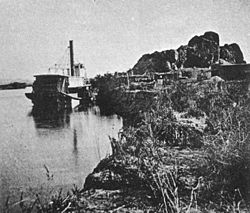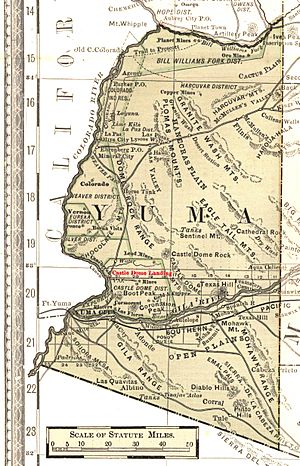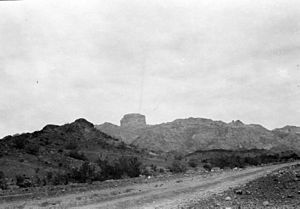Castle Dome Landing, Arizona facts for kids
Quick facts for kids
Castle Dome Landing, Arizona
|
|
|---|---|

Castle Dome Landing, 1877
|
|
| Country | United States |
| State | Arizona |
| County | Yuma |
| Founded | 1869 |
| Abandoned | 1978 |
| Named for | Castle Dome Mountains |
| Elevation | 203 ft (62 m) |
| Population
(2009)
|
|
| • Total | 0 |
| Time zone | UTC-7 (MST (no DST)) |
| - Opened | December 17, 1875 |
| - Closed | December 4, 1876 |
| - Opened | August 6, 1878 |
| - Closed | June 16, 1884 |
| GNIS feature ID | 24347 |
Castle Dome Landing, Arizona (sometimes called Castle Dome City) is a ghost town located in the Castle Dome Mountains of Yuma County, Arizona. It started as a place to transport goods and a mining camp around 1863, when Arizona was still a territory.
Contents
Exploring Castle Dome's Past
Long ago, even before American settlers arrived in the Castle Dome Mountains in the 1860s, there were signs that people had mined there. It's believed that Native American tribes mined in these mountains. They would carry the mined rock about 18 miles (29 km) south to the Gila River. There, they used adobe furnaces to process the ore.
In the early 1860s, people found many valuable minerals along the Colorado River. This led to the growth of mining camps and steamboat ports. Prospectors searched for gold and silver near Yuma and in the mountains. In 1863, the Castle Dome Mining Company bought many of these claims. They planned Castle Dome Landing on the Colorado River to ship ore to California for processing.
The Castle Dome Mining Camp
Even though people started looking for minerals years earlier, serious mining didn't begin until 1869. This was due to conflicts with Native American groups. When mining finally began, the camp was called Pitoti, named after a local plant. As the area grew, it was renamed Castle Dome. A post office opened there on December 17, 1875. However, it closed less than a year later, on December 4, 1876.
Castle Dome Landing Thrives
While the mining camp faced challenges, the nearby landing by the river began to do very well. This landing was built for steamboats of the Colorado River to transport ore and supplies. It served the mines about 17 miles (27 km) east of the river. This new town was named Castle Dome Landing.
The post office reopened under this new name on August 6, 1878. Castle Dome Landing became a busy hub for shipping and supplies. For the next six years, it was the first stop for steamboats traveling north from Yuma. The town became a popular spot for travelers from Yuma, who came for celebrations. Mexican Independence Day on September 16 was a big event there.
Some stories say the town's population reached over 3,000 people by 1880. It was said to be as big as Yuma and almost became the name for Yuma County. Other records suggest about 50 people lived there full-time. At its busiest, Castle Dome Landing had a post office, a hotel, a saloon, a general store, and facilities for smelting (melting ore).
The Town's Decline
Like many mining boomtowns, Castle Dome Landing eventually saw less mining activity. Its post office closed on June 16, 1884. The mines reopened in 1890 and became an important source of lead during World War I and World War II. For example, in 1943, the Arizona Lead Company reopened the mines. They produced a lot of lead to help with the war effort.
After World War II, the need for lead decreased. The town slowly declined again, though some mining continued. The school closed in 1950. The mines opened and closed as the price of silver, which was still found there, went up and down. By 1978, all the mines were shut down, and the last residents had left.
What's Left Today
The original site of Castle Dome Landing is now underwater. It's beneath the Imperial Dam reservoir in Martinez Lake.
However, the property where the Castle Dome town and mining camp once stood was bought in 1994. Allen and Stephanie Armstrong turned it into the Castle Dome Museum. The museum has over 50 restored and rebuilt buildings. Seven of these buildings are original to the town. The others are recreations built mostly from old materials found nearby. Each building, like the saloon, hotel, mill, and blacksmith shop, looks just as it might have 100 years ago.
Mining in Castle Dome
At first, people were looking for silver in the area. But many of the "silver" discoveries turned out to be galena, which is a lead ore. It became clear that the area had much more lead than silver.
The Castle Dome mining district is one of the oldest and most productive mining areas in Yuma County. Because it was close to the Colorado River, shipping costs were low. This made it profitable to mine even lower-quality ore that might not have been worth mining elsewhere. Besides silver and lead, the area has many other minerals. These include zinc, copper, gold, and more.
Over time, the Castle Dome mines produced a lot of minerals. This included 10,697 short tons (9,704 metric tons) of lead and 498,000 troy ounces (15,500 kg) of silver. They also produced zinc, copper, and gold. A lot of placer gold (gold found in riverbeds) was also collected before 1900.
The Castle Dome mining district is also popular with mineral collectors. The region is known for beautiful combinations of minerals like cerussite, fluorite, vanadinite, wulfenite, barite, and mimetite. You can also find galenite and anglesite. The Hull Mine and Puzzler Mine are famous for unusual green vanadinite and mimetite, as well as yellow wulfenite.
Where is Castle Dome?
The original Castle Dome Landing, which is now underwater, is located about 30 miles (48 km) north of Yuma. Its coordinates are 32°57′54″N 114°27′49″W / 32.96500°N 114.46361°W.
The site of the original Castle Dome town and mining camp, now the Castle Dome Museum, is located at 33°02′28″N 114°10′50″W / 33.04111°N 114.18056°W. It is very close to the Castle Dome Mine, which is at 33°02′25″N 114°10′30″W / 33.04028°N 114.17500°W.
See also
- List of ghost towns in Arizona
- Silver mining in Arizona
- Steamboat transport on the Colorado River





